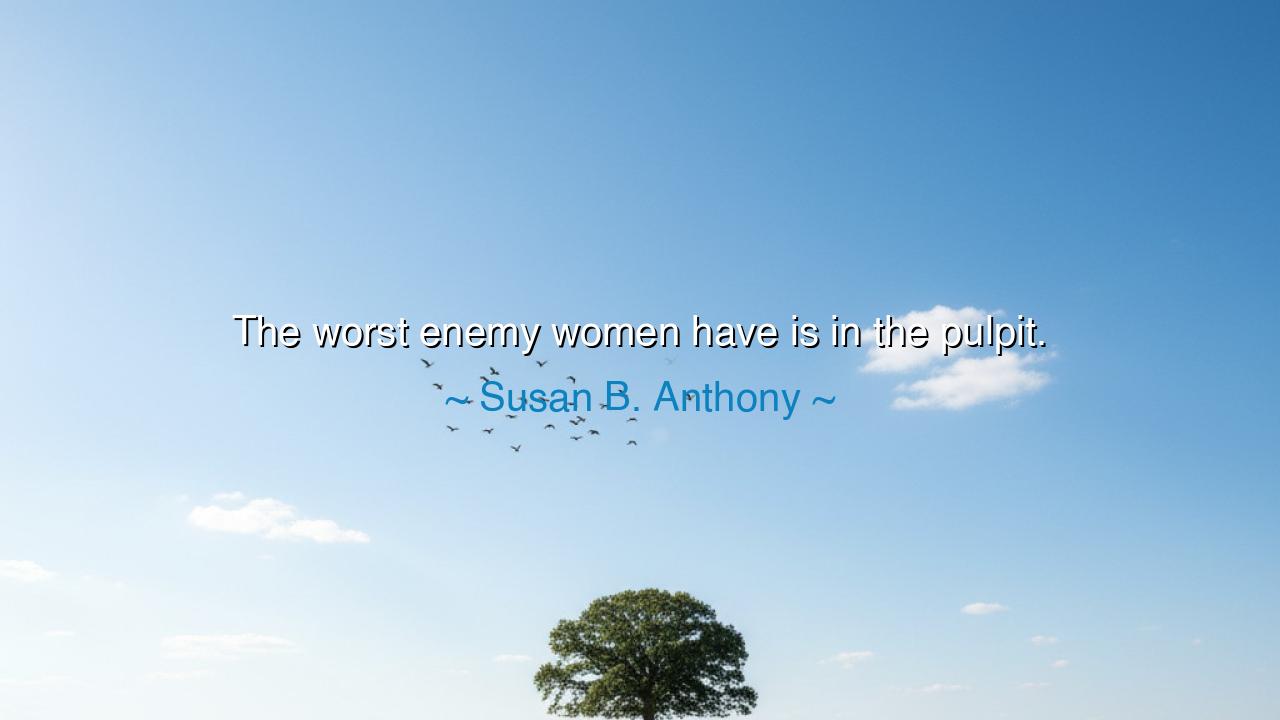
The worst enemy women have is in the pulpit.






Susan B. Anthony, the tireless crusader for suffrage and justice, once declared with fierce clarity: “The worst enemy women have is in the pulpit.” In these words lies both a rebuke and a revelation—that the oppression of women was not sustained only by laws or customs, but sanctified by the voice of religion. From the sacred platform, clothed in divine authority, men spoke words that bound women to silence and submission, making chains seem holy and subjugation appear as destiny.
The origin of this cry lies in the 19th century battle for women’s rights in America. Anthony and her companions saw that every argument for keeping women from the ballot box, from education, from property, and from freedom was supported by preachers who thundered scripture against them. The pulpit, which should have been the guardian of justice, became instead the loudest voice of resistance. To Anthony, this betrayal was more bitter than any politician’s sneer, for it gave the weight of heaven to the injustice of earth.
History proves her words. In the days of the Abolition movement, many churches in the South used the Bible to defend slavery, declaring it God’s will that one race should be bound in chains. In the same way, countless ministers declared it God’s will that women be subject to men. It was not enough for Anthony to fight politicians; she had to battle the very guardians of faith, who stood as bulwarks against freedom. Thus, the pulpit became the worst enemy, because it gave divine sanction to human inequality.
And yet, as with all struggles, resistance also bred courage. Women like Anthony, Elizabeth Cady Stanton, and Sojourner Truth stood up to this holy opposition, declaring that the voice of God could not be confined to the mouths of men. They challenged scripture, wrote their own interpretations, and proclaimed that justice, not silence, was the true will of the Divine. Their defiance turned the pulpit’s condemnation into a spark for reform.
Therefore, O children of tomorrow, let Anthony’s words be a warning. Beware the misuse of sacred authority to justify injustice. Know that true faith does not bind, but liberates; it does not silence, but uplifts. The worst enemy of women is not man alone, but the voice that cloaks his power in holiness. And the greatest ally of justice is the courage to unmask such voices, and to speak truth even in the face of the pulpit’s fire.






HHThu Hang Ha
When I read Susan B. Anthony’s quote, I think about how the influence of religion on women’s rights has evolved over time. Is there still an implicit or explicit message in many religious teachings that holds women back? What role can religious leaders and communities play in transforming the narrative around gender equality? Could they use their platform to actively support women’s rights, or does the legacy of the pulpit as an enemy still linger?
TTNguyen Thanh Thao
Susan B. Anthony’s assertion is bold and confrontational. The idea that the pulpit, as a seat of moral authority, could be one of the greatest forces against women's rights is chilling. It raises the question—how much does religion still shape policies and opinions that restrict women’s freedom? How do we navigate the tension between personal faith and advocating for women’s equality in today’s world?
YPYen Pham
I can’t help but reflect on the enduring power that religious institutions have over social values. This quote seems to suggest that spiritual leadership is often deeply entwined with societal control. How have these institutions used their influence to promote male dominance? Are there still places where this idea holds true, and how do we challenge that? Could the church and other religious spaces play a more positive role in advancing women’s rights?
DNDong Nhi
It’s hard not to feel anger when reading Susan B. Anthony’s words. For her to call the pulpit the 'worst enemy' of women speaks volumes about how religious institutions have historically been complicit in the oppression of women. How much harm has been done over the centuries, not just by secular authorities, but by religious figures who hold such sway over communities? Is it time for religion to reconsider its stance on gender equality?
LTLinh Truc
Susan B. Anthony's statement is powerful, especially when considering how much influence religious leaders have had in shaping public opinion throughout history. What makes this quote particularly relevant today? Do we still see examples of religious teachings being used to control or limit women’s rights? How can faith communities evolve to be more inclusive and supportive of gender equality without losing their core beliefs?